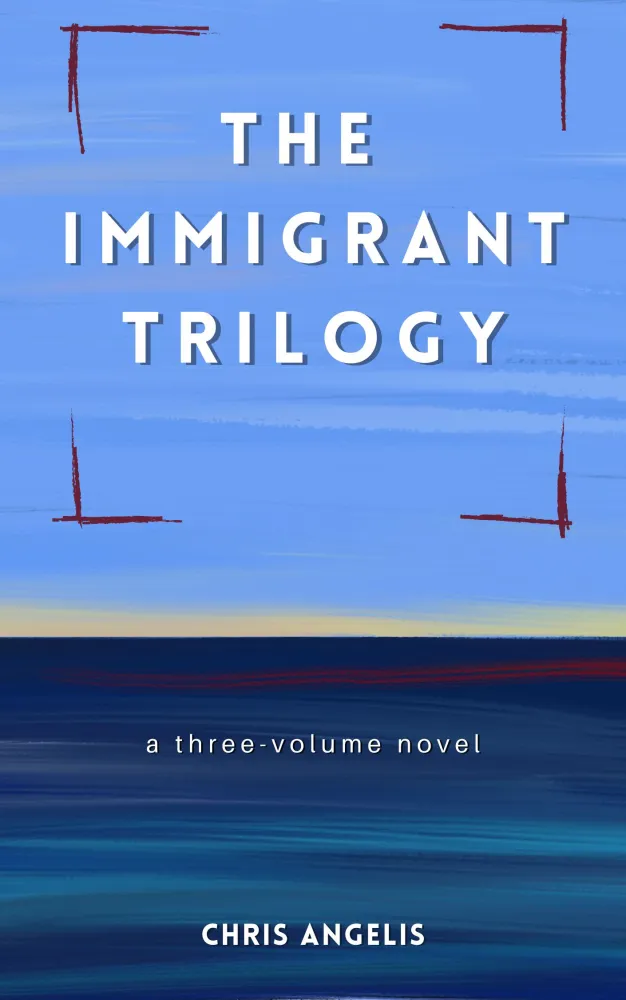July 31, 2025
The Immigrant Trilogy
The Immigrant Trilogy comprises three previously published works: To Cross an Ocean: Apognosis, The Other Side of Dreams, and The Storytelling Cat. These three works can be read independently – indeed, the order doesn’t matter – but only by reading all three of them can a reader appreciate the full scope of the themes involved. In that sense, I view The Immigrant Trilogy not as a collection of three novels but a three-volume novel.
The title gives an indication of the major connective element: immigration. However, although the plots and characters of this work do focus on actual immigration – being a stranger in a strange land – the concept must be examined from a more general, more metaphorical perspective.
We are all immigrants in some aspects of our lives. Some of us might be non-binary, others might be disabled. Perhaps we are single parents, or we try to cope with some mental health challenge. The bottom line is, one way or another we are “misfits”; we (feel that we) don’t belong.

The Immigrant Trilogy or “The Greek Trilogy”
Besides immigration, there are plenty of other common elements in these volumes: The most obvious is the way characters – and motifs – create ripples by their not-quite-similar repetition from one to the other.
Yes, we see the same characters and motifs, and yet they are not the same. It’s neither a line nor a cycle; it’s a spiral. Another element is that much of the plot in each volume takes place in Greece. Indeed, at some point I considered naming this “The Greek Trilogy”, which was the unofficial name I used for many years.
It was only very recently that I, the author, realized immigration was a connective tissue – especially from a more metaphorical perspective. This might sound peculiar, particularly in the context of common characters and motifs, as I mentioned. However, creating art is a process that isn’t entirely conscious. To put it simply, sometimes books take over.
Style and Literary Dynamics
In terms of style and literary dynamics – and without wanting to impose too many of my own interpretations and motivations to the reader – there is a clear progression from one volume to the next; an evolution of sorts, not unlike what sociologists would term culture shock or integration process in immigration discourses. First everything is rosy, then despair strikes. And then later, all options are open.
And so, Volume I (Apognosis) eases the reader into the subject matter. It can be considered accessible literary fiction, with elements borrowed from genre fiction such as romance. The progression is fairly straightforward, and although there is brooding retrospection and not a little darkness involved, it generally portrays the world in optimistic tints.
Volume II (Other Side), on the other hand, is not only much darker and pessimistic (though not naturalistic), but far more complex in terms of interpersonal dynamics. Whereas earlier everything seemed simpler, easy to gauge, now things become increasingly grayer. In the words of a character, “Back then it was easy to give a form to the dream and a name to the placeholder called ‘hope.’”
Ambiguity, Abstractness, Disruption
As for Volume III (Storytelling Cat), here is where things become mightily peculiar. In a sense, here is where all pretense is dropped. The style is paradoxical – at the same time simpler and more complex, encompassing two apparently contradictory facets at the same time.
On the surface, the story progression is very easy to follow; I’d even call the first part young-adult in style. However, eventually – and especially in the second part of Volume III – the reader is exposed to a vastly different literary landscape. Although the story progression continues to be easy to follow – a bit like the setting: a lazy summer on a Greek island – the conceptual sinews are far more intricate.
There is an increasingly more nebulous, despairing background to what initially appeared as a simple feel-good return to innocence, and I would expect the very end of Volume III – and The Immigration Trilogy as a whole – to leave the reader positively at a loss for words with its emotional impact.
Indeed, maybe the character (and what they symbolized) whose words echo in the denouement was right when they claimed we’re all alone. But there’s also something else, something which is very important:
We can be alone together, and that has made all the difference.
Most of my fiction is available as an immediate free download – simply visit the Fiction page on the main site.
I don't show you ads, newsletter pop-ups, or buttons for disgusting social media; everything is offered for free. Wanna help support a human internet?
(If you'd like to see what exactly you're supporting, read my creative manifesto).
